R.J. Stowell's Blog: rjsomeone, page 4
August 24, 2021
The Passing of a Legacy - Charlie Watts Dies at 80
"

It is with immense sadness that we announce the death of our beloved Charlie Watts. He passed away peacefully in a London hospital earlier today surrounded by his family," his spokesperson said Tuesday in an emailed statement to CNN."Charlie was a cherished husband, father and grandfather and also as a member of The Rolling Stones one of the greatest drummers of his generation."The quiet, elegantly dressed Watts was often ranked with Keith Moon, Ginger Baker, and a handful of others as a premier rock drummer, respected worldwide for his muscular, swinging style as the Stones rose from their scruffy beginnings to international superstardom. He joined the band early in 1963 and remained over the next 60 years, ranked just behind Mick Jagger and Keith Richards as the group’s longest-lasting and most essential member.
Published on August 24, 2021 11:20
August 16, 2021
Human Highway
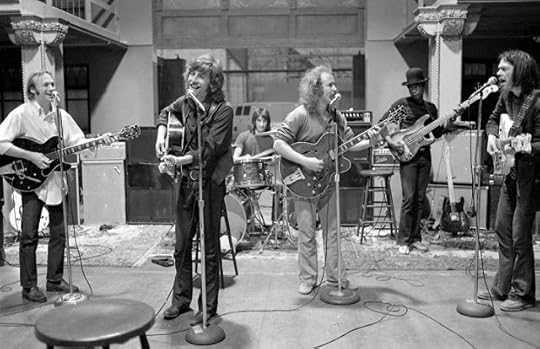
CSNY’s Human Highway is often called “the SMiLE of the 1970s,” referring to The Beach Boys infamous unreleased LP. Over the years, just like we did with SMiLE, many of us have tried to put together a fantasy playlist that might emulate what Human Highway may have been.I have notes scribbled in a journal as far back as 1977 that includes a tracklist of songs like Neil’s “On the Beach” or “Walk On,” or Graham Nash and Neil Crosby’s “Homeward Through the Haze,” to me the track with a distinctive Déjà Vu vibe.In the early 70s, few albums were as anticipated as eagerly as CSNY’s follow-up to Déjà Vu. Of course, we never got it. Plenty of the foursome on their own or paired and by the end of the 70s, an LP without Young, but Human Highway never happened. On at least three occasions, CSNY gave it an effort with mid-1973 and late 1974 as the highpoints of the collaboration, but each ventured crash landed after only a few days.In 1976, Neil Young and Stephen Stills were in the studio eventually inviting Graham Nash and David Crosby to add vocals to finished tracks. Once again, things fell apart; the album (Long May You Run) was released as Stills-Young Band project and Crosby and Nash’s vocals were edited out. That had to help.The bones of the LP, including songs like Nash’s “Prison Song,” Stills’ “First Things First,” and C&N’s “Homeward Through the Haze” would eventually find their way on vinyl, but without the foursome playing nice. Human Highway wasn’t happening. I love the bits and pieces, though; my favorite among them was included by Young with Crazy Horse on the iconic LP Zuma: “Through My Sails,” a Laurel Canyon-esque hippie ballad about leaving the past behind. The song featured CSN harmonies floating behind Young, vocals that conjured images of Woodstock or a heavenly night at Joni’s house. Looking through my old journals, I have been piecing together notes and scenarios for my latest project, Half-Crazy, which utilizes the familiar faces in my novel Calif. The title derives from the main character, Daisy Lane and alludes to the lyrics to the nursery song, “Daisy, Daisy.” Daisy is enamored by the music of Laurel Canyon, from Joni to CSNY to the Doors, and as I write the novel, I’m obsessing over Human Highway in much the same way that Daisy does.
Published on August 16, 2021 05:39
August 13, 2021
Elton John/Bernie Taupin - The Early Years
 Although the pudgy kid known as Reg Dwight had always considered a music career, he'd spent the 60s as an un-credited studio musician for artists like The Hollies, until, in 1966, he answered an ad from Liberty Records and was given lyrics by a 17-year-old Bernie Taupin. Reg was so taken by Bernie's words that he wrote songs for each, though he wouldn't meet Taupin for six months. Before long, they found their songs covered by everyone from Aretha Franklin to Three Dog Night. And although that success got the newly-named Elton John a record deal, it didn't produce immediate results: it was two years before he scored his own hit with 1970's "Your Song." A tremendously influential series of live performances at L.A.'s Troubadour proved that John - who'd been a huge Jerry Lee Lewis fan - could rock as hard as anyone, and before long his solo career was taking off both on stage and in the studio.
Although the pudgy kid known as Reg Dwight had always considered a music career, he'd spent the 60s as an un-credited studio musician for artists like The Hollies, until, in 1966, he answered an ad from Liberty Records and was given lyrics by a 17-year-old Bernie Taupin. Reg was so taken by Bernie's words that he wrote songs for each, though he wouldn't meet Taupin for six months. Before long, they found their songs covered by everyone from Aretha Franklin to Three Dog Night. And although that success got the newly-named Elton John a record deal, it didn't produce immediate results: it was two years before he scored his own hit with 1970's "Your Song." A tremendously influential series of live performances at L.A.'s Troubadour proved that John - who'd been a huge Jerry Lee Lewis fan - could rock as hard as anyone, and before long his solo career was taking off both on stage and in the studio.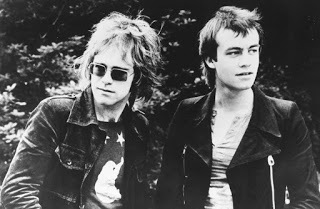 Bernie Taupin was born in 1950 at Flatters Farmhouse in the southern part of Lincolnshire England. He was not a diligent student but showed an early flair for writing. His maternal grandfather was a classics teacher and graduate of the University of Cambridge, his mother studied French Literature, and his father was a farmer. They taught him an appreciation for nature and for literature and narrative poetry, all of which influenced his lyrics. At age 15, he left school and started work as a trainee in the print room of the local newspaper, The Lincolnshire Standard with aspirations to be a journalist. He soon left and spent the rest of his teenage years hanging out with friends, hitchhiking the country roads to attend youth club dances in the surrounding villages, playing snooker in the Aston Arms Pub in Market Rasen, and drinking. He'd worked at several part-time jobs when, at age 16, he answered the advertisement that eventually led to his collaboration with Elton John.
Bernie Taupin was born in 1950 at Flatters Farmhouse in the southern part of Lincolnshire England. He was not a diligent student but showed an early flair for writing. His maternal grandfather was a classics teacher and graduate of the University of Cambridge, his mother studied French Literature, and his father was a farmer. They taught him an appreciation for nature and for literature and narrative poetry, all of which influenced his lyrics. At age 15, he left school and started work as a trainee in the print room of the local newspaper, The Lincolnshire Standard with aspirations to be a journalist. He soon left and spent the rest of his teenage years hanging out with friends, hitchhiking the country roads to attend youth club dances in the surrounding villages, playing snooker in the Aston Arms Pub in Market Rasen, and drinking. He'd worked at several part-time jobs when, at age 16, he answered the advertisement that eventually led to his collaboration with Elton John.Bernie’s unique blend of influences gave his early lyrics a nostalgic romanticism that fit perfectly with the hippie sensibilities of the late 1960s and early 1970s. He sometimes wrote about specific places in his home town of Lincolnshire. For example, Grimsby or ‘Caribou’ was a tongue-in-cheek tribute to a nearby port town often visited by Taupin and his friends. More famously,"Saturday’s Alright For Fighting" was inspired by Taupin’s experiences in the dance halls and pubs of his youth. More often he wrote in more general autobiographical terms, as in his reference to hitching rides home in "Country Comfort." These autobiographical references to his rural upbringing continued after his departure for London and a life in show business, with songs such as "Honky Cat," "Tell Me When The Whistle Blows" and "Goodbye Yellow Brick Road," in which he thinks about "going back to my plough."Together, Bernie and Elton found a niche with what might be assumed American folk, somewhere along the lines of Woody Guthrie or Ramblin’ Jack Elliot, their music that storied, that romantic. For Tumbleweed Connection, Elton's forth LP, the pair crafted an LP of ten songs with a theme they couldn't have known much about, except through books and Taupin's imagination: the American Civil War and subsequent land expansion out west. Though falling short of a masterpiece, the duo found a way to express their fantasy in an unusually conceptual album. "Ballad of a Well-Known Gun" opens the album, addressing the concerns of a man arrested for unspecified crimes, yet showing deep remorse when he's thrown in prison by the Pinkertons (the forerunner of modern-day detective agencies), as well as losing all his ill-gotten gains. The dusty verisimilitude seeps out of "Song of Your Father" and "Talking Old Soldiers;" the former about a blind man who confronts a "friend" who owes him money by brandishing a rifle. The accused relents, but only to bide time to gain the advantage over the blind gun-toter; the result is two men "lying dead as nails on an East Virginia farm." That's storytelling, and Taupin is the kingpin of rock storytelling. The latter track deals with an aged Civil War vet who stumbles upon a fellow warrior. Taupin's lyrics are superb, and the idea of two former soldiers drowning their sorrows over everyone's lack of understanding as to what they went through, can be a hard topic to cover in a three minute pop song. However, with only Elton's rising and falling piano chords the only accompaniment, it works splendidly.
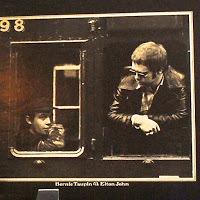 Of course, you have two wonderful love songs, "Come Down in Time", featuring the orchestration of Paul Buckmaster. Though the theme is esoteric, it lends an air of mystery and charm. "Love Song", a song written by Lesley Duncan, is a stark tune played on acoustic guitar with deft toe-tapping noticeable."Where to Now, St. Peter?" is a swirling blues rocker about a man's journey into death, while questioning his fate and faith. Again, Taupin's esoteric themes make this song less than cut-and-dried, and all the more intriguing. One of the best tracks is "Burn Down the Mission", an old concert favorite. The war between the haves and have-nots is eloquently stated, with Elton's rising and falling piano competing with Buckmaster's strings. "My Father's Gun" is the tale of the Johnny Reb who buries his father (killed by a Northern soldier), and vows to avenge his death by finding the nearest regiment. "Country Comfort" is hokey like a hoedown and the bouncy "Amoreena" is a lot of fun, strongly evoking the Southern coquette pictured so vividly in the listener's mind. Tumbleweed Connection is an album reminiscent of another Brit take on American life 100 years ago, The Notting-Hillbillies. Tumbleweed Connection is Elton country-bluegrass, and it works on just the right level.
Of course, you have two wonderful love songs, "Come Down in Time", featuring the orchestration of Paul Buckmaster. Though the theme is esoteric, it lends an air of mystery and charm. "Love Song", a song written by Lesley Duncan, is a stark tune played on acoustic guitar with deft toe-tapping noticeable."Where to Now, St. Peter?" is a swirling blues rocker about a man's journey into death, while questioning his fate and faith. Again, Taupin's esoteric themes make this song less than cut-and-dried, and all the more intriguing. One of the best tracks is "Burn Down the Mission", an old concert favorite. The war between the haves and have-nots is eloquently stated, with Elton's rising and falling piano competing with Buckmaster's strings. "My Father's Gun" is the tale of the Johnny Reb who buries his father (killed by a Northern soldier), and vows to avenge his death by finding the nearest regiment. "Country Comfort" is hokey like a hoedown and the bouncy "Amoreena" is a lot of fun, strongly evoking the Southern coquette pictured so vividly in the listener's mind. Tumbleweed Connection is an album reminiscent of another Brit take on American life 100 years ago, The Notting-Hillbillies. Tumbleweed Connection is Elton country-bluegrass, and it works on just the right level.
Published on August 13, 2021 06:00
August 8, 2021
The Story Song - Joni Style
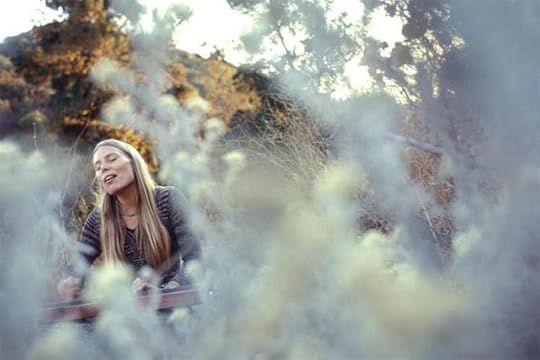
One of my guilty pleasures as an English teacher has been the story song. So often kitschy, songs like “Wildfire,” “Taxi” and Bobbie Gentry’s “Ode to Billy Joe,” were always a hoot to teach in class. The latter, among my favorites, is classic Southern-American Gothic poetry that achieves its poetic value through the subordination of event to situation. "Ode to Billie Joe" seems a simple narration of events, journalism-style: the narrator and Billie Joe throwing something off the bridge, Billie Joe jumping off the bridge - a pretty vivid picture. Yet the listener doesn't know what the pair are throwing off the bridge and we don't know why Billie Joe killed “hisseff.” Instead, what is revealed with utter clarity is the narrator's situation: she is spoken to and spoken about within the poem, but she herself is never allowed to speak; she is closely monitored (told to wipe her feet, interrogated for not eating, observed and reported on) but not recognized at all; she is kept in place by society, but is afforded no place in that society; on and on. In Aristotelian/English teacher terms, Bobbie Gentry's hit inverts the tragic focus on mythos for a lyric focus on ethos. It takes to heart Emily Dickinson's advice to "tell all the truth but tell it slant."But let’s discuss the story song from a Joni perspective. the Joni perspective. From Blue, we get “The Last Time I Saw Richard.” Here we don't find the cheesiness associated with story songs, this is hardcore realism. Joni's motif usually encompasses snippets of relationships as we, the listeners, take what we will and fill in the missing pieces. Yet in "The Last Time I Saw Richard," we get a full-blown short story, start to finish. Whether about Chuck Mitchell (or Taylor or Crosby or Nash or…), that we don't know, but the scene opens with Joni recalling a barroom conversation three years prior in which an older ex-lover attempts to shut down her youthful enthusiasm with melancholy and disparate philosophical musings: "All romantics meet the same fate someday: cynical and drunk and boring someone in some dark café." Pure poetry. Richard projects his despair onto her, scoffing when she laughs when he says: "Roses and kisses and pretty men to tell you all those pretty lies." Richard is bitter, though a youthful Joni cuts him off as he wallows in his pain while gushy love songs play on the jukebox. The scene takes place in 1968, around the time Joni was establishing herself in the Laurel Canyon/Hollywood scene. The song is classic storytelling that evokes the idea that as time progresses, we grow apart, we’re not the people we once were. Joni's eyes are "full of moon" and poor Richard Whiney Pants in his self-pity merely comes off as comical; the guy you just want to say, "deal," or prescribe Zoloft."The Last Time I Saw Richard" is a story song masterstroke that could have, indeed, been written by an Emily (Dickenson or Bronte).
Published on August 08, 2021 08:05
August 6, 2021
Twelve Thirty (AM10)
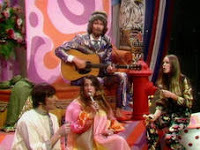 The Mamas and the Papas' "Twelve-Thirty" has been resonating in my mind, endlessly cycling in my head. It helps that I'm a sucker for impeccable lyrics, delicious harmonies, and twisting melodies. It may be John Phillips' greatest contribution, particularly the irony implicit in the light arrangement and misleading melancholic poetry.
The Mamas and the Papas' "Twelve-Thirty" has been resonating in my mind, endlessly cycling in my head. It helps that I'm a sucker for impeccable lyrics, delicious harmonies, and twisting melodies. It may be John Phillips' greatest contribution, particularly the irony implicit in the light arrangement and misleading melancholic poetry. The song opens on a delectably baroque minor chord (love that), which will eventually become the relative minor of the main key. The quiet stasis of the melodic line, which resolves entirely on either guarded majors or deceptive minors, accents the melancholy of the lyrics (I didn't decipher that music theory on my own; the description comes from a musician and critic far more perceptive than I):
I used to live in New York CityEverything there was dark and dirtyOutside my window was a steepleWith a clock that always said 12:30
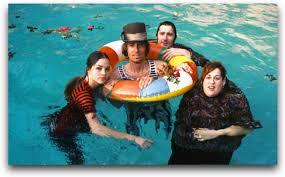
This is a realistic NYC (not the idealized one from a Woody Allen film), exemplifying the wasteland that characterized the Village in the 1960s. Even the church, for John Phillips the last outpost of solace and safety (recall "California Dreaming"), is stuck in time , indicative of greener pastures, i.e. Los Angeles. There was a saying growing up in L.A. in the 60s that the earth was tilted southwest, and everything loose fell to California; everyone was from somewhere else. (Ironically there's a quote from the Paul Mazursky film, Blume in Love, from a girl at a party: "L.A. is the center of the universe, but you can't breathe the air." Still they came:
Young girls are coming to the CanyonAnd in the morning I can see them walkingI can no longer keep my blinds drawnAnd I can't keep myself from talking
The melody is instantly memorable and celebratory. The voices and instrumentation open up as well, reflecting the narrator's personality. The mood shifts from delicate Baroque stylings to mid-60s pop that unabashedly uses that poppiest of rhymes: walkin' and talkin'. Most importantly, though, is the change in tense between verse and chorus. The melancholy verse is the past, the music sounds like a black and white photograph. The celebratory chorus, though, is the here and now, and the ensemble sings with color and vibrancy and optimism.
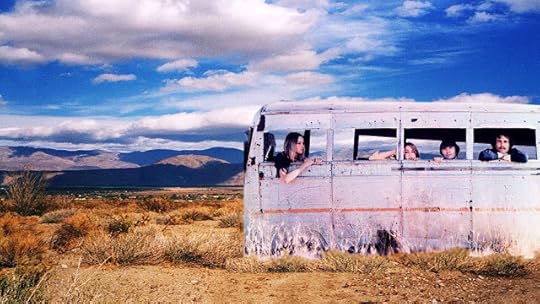
Or so it seems. The second verse describes the bewilderment of being friendly and cheery, the "Have a nice day" L.A. ideology. "At first so strange to feel so friendly/To say 'Good morning' and really mean it," sings the narrator. It's a dig about New York rudeness, its posture of importance and business that views simple pleasantries as naive idiocies. Like a child discovering social mores through her parents, the narrator must re-rediscover how to act, Cali style. The buoyancy of the chorus is subdued by the narrator's self-consciousness. The chorus comes in to signal his attempt to overcome himself and celebrate the beautiful canyon full of approachable beautiful women.
Cloudy waters cast no reflectionImages of beauty lie there stagnantVibrations bounce in no directionBut lie there shattered into fragments
Through its almost labored abstraction, in this perceptive final verse the narrator realizes that the beauty and "vibe" of Southern California are equally as fragmented as dark and dirty New York City. Bizarrely, this lyric is set to music that extraordinarily recalls the chorus. A listener can completely miss these lines if she doesn't pay careful attention. lost amidst the joy.
"Twelve Thirty" is a deceptively simple single and in it we find a highly underrated John Phillips, not just as songwriter, but as a voice to put into place the reality of the times, separating it from the ideal or the hypothetical, reflecting rather than proselytizing. Unlike the article in the previous post, Phillips makes no moral judgment, merely, in a purely journalistic style, he creates a pastiche of the times.
Published on August 06, 2021 08:14
August 3, 2021
"Creeque Alley" Step By Step - Hits of '67
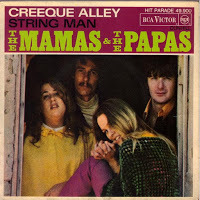 I get a kick out of it when artists refer to other artists in song. In case of eavesdroppers, we get Steely Dan's advice to "Turn up the Eagles, the neighbors are listening," and from Neil Young's "Long May You Run": "Maybe The Beach Boys/ Have got you now/ With those waves/ Singing 'Caroline No'/ Rollin' down/ That empty ocean road/ Gettin' to the surf on time."
I get a kick out of it when artists refer to other artists in song. In case of eavesdroppers, we get Steely Dan's advice to "Turn up the Eagles, the neighbors are listening," and from Neil Young's "Long May You Run": "Maybe The Beach Boys/ Have got you now/ With those waves/ Singing 'Caroline No'/ Rollin' down/ That empty ocean road/ Gettin' to the surf on time."But it was Papa John Phillips who set the standard with "Creeque Alley" in 1967. "Creeque Alley" was released on The Mamas and The Papas third LP Deliver. It tells the story of the formation of the band and serves as an exposé of the L.A. Scene that led to all that California Dreamin'. (Creeque Alley, btw (pronounced Creek-y), is a spiderweb of streets surrounding the docks on St. Thomas.)
John and Mitchie were gettin' kinda itchy just to leave the folk music behind. John Phillips was a member of folkies The Journeymen, along with Scott McKenzie ("San Francisco"). Late in '64, John and his wife, Michelle, formed The New Journeymen with and Denny Doherty, but before the end of the year John was "itchy" for something new. In a different world in the cold north, Zal and Denny [were] workin' for a penny tryin' to get a fish on the line, a reference to Denny's band The Halifax Three, which he'd started with Zal Yanovsky.
In a coffee house Sebastian sat and after every number they passed the hat. Sebastian, you've already guessed, is John Sebastian who would go on to found The Lovin’ Spoonful. "They passed the hat" is a reference to the way bands were paid in the coffee houses of the sixties. McGuinn and McGuire just are gettin' higher in L.A. you know where that's at is a reference to McGuinn's band The Byrds, and Barry McGuire had already had a hit with "Eve of Destruction"; all these references predating The Mamas and The Papas. The line is an indirect reference to drug use as well, and more directly to The Byrds' "Eight Miles High." The song's coda, And no one's getting fat except Mama Cass, only incidentally refers to Cass's weight, but more directly to Cass as the only one with any degree of success (as a jazz singer in D.C.).
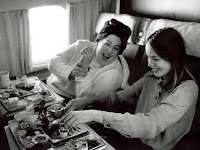 John Phillips remembers, "[Cass] met Denny, and Denny said, 'I know this girl that sings wonderfully. We should have her over and sing with her.' It happened to be that LSD was actually legal at the time. It wasn't a banned drug or anything. We searched all over the Village and found some contemporary artist who had some and he gave it to us. We were about to take it that night, when the knock on the door came and Cass came in. So we all had it together the same night, for the first time, and I think that formed a bond between the four of us that we just never stopped singing. We just went on and on and on and on, until the trip wore off, which was about four years later."
John Phillips remembers, "[Cass] met Denny, and Denny said, 'I know this girl that sings wonderfully. We should have her over and sing with her.' It happened to be that LSD was actually legal at the time. It wasn't a banned drug or anything. We searched all over the Village and found some contemporary artist who had some and he gave it to us. We were about to take it that night, when the knock on the door came and Cass came in. So we all had it together the same night, for the first time, and I think that formed a bond between the four of us that we just never stopped singing. We just went on and on and on and on, until the trip wore off, which was about four years later."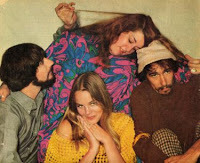 Zallie said 'Denny, you know there aren't many who can sing a song the way that you do'; Let's go South) acknowledges Denny's prowess as a singer and "south" in this case means NYC (south of Halifax). Denny said 'Zallie, golly, don't you think that I wish I could play guitar like you' is a bit more log rolling, this time about Zal's virtuoso guitar playing.
Zallie said 'Denny, you know there aren't many who can sing a song the way that you do'; Let's go South) acknowledges Denny's prowess as a singer and "south" in this case means NYC (south of Halifax). Denny said 'Zallie, golly, don't you think that I wish I could play guitar like you' is a bit more log rolling, this time about Zal's virtuoso guitar playing.Zal, Denny and Sebastian sat (at the Night Owl) [The Night Owl Café in the Village], and after every number they passed the hat./ McGuinn and McGuire still are gettin' higher in L.A. you know where that's at./ And no one's getting fat except Mama Cass. By this time, though, The Byrds had had two No. 1 singles with "Mr. Tambourine Man" and "Turn, Turn, Turn."
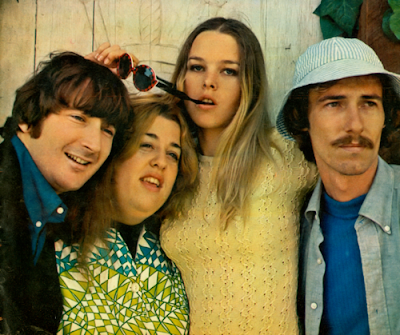
When Cass was a Sophomore, planned to go to Swarthmore [a Philadelphia area college],/ But she changed her mind one day. / Standing on the turnpike (New Jersey Turnpike – equally immortalized in Simon and Garfunkel's “America.”) , thumb out to hitchhike, Take her to New York right away.
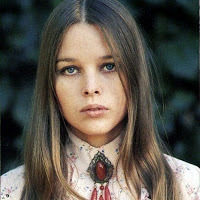 When Denny met Cass he gave her love bumps. Cass was in love with Denny from the moment she had met him during their days with The Mugwumps. During the group's visit to the Virgin Islands she learned that Michelle had slept with Dennny. This caused a ton of tension with the group. Indeed Cass went to Michelle and said, "You can have any man you want. Why did you have to sleep with the one man I love?" Based on Denny's and Michelle's affair, John wrote "I Saw Her Again" and made them sing it as a form of punishment. Ah, the drama - shots are fired. Called John and Zal, and that was the Mugwumps. The "John" in this reference was obviously John Sebastian, who, according to his biography, was an original member of the Mugwumps with Zal, Denny and Cass prior to forming the Spoonful.
When Denny met Cass he gave her love bumps. Cass was in love with Denny from the moment she had met him during their days with The Mugwumps. During the group's visit to the Virgin Islands she learned that Michelle had slept with Dennny. This caused a ton of tension with the group. Indeed Cass went to Michelle and said, "You can have any man you want. Why did you have to sleep with the one man I love?" Based on Denny's and Michelle's affair, John wrote "I Saw Her Again" and made them sing it as a form of punishment. Ah, the drama - shots are fired. Called John and Zal, and that was the Mugwumps. The "John" in this reference was obviously John Sebastian, who, according to his biography, was an original member of the Mugwumps with Zal, Denny and Cass prior to forming the Spoonful.Mugwumps, hi-jumps, low slumps, big bumps,/ Don't you work as hard as you play./ Drink-up, break-up, everything is shake-up/ Guess it had to be that way refers to the inevitability of the Mugwumps' breakup. Sebastian and Zal formed the Spoonful,/ Michelle, John and Denny gettin' very tuneful is another reference to The New Journey Men, and then of course McGuinn and McGuire just are catchin' fire in L.A. you know where that's at is self explanatory.
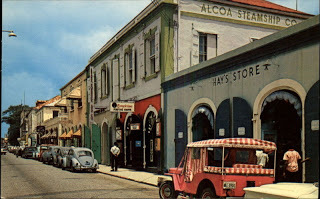 Finally the refrain (in the way that Poe’s "Raven" progresses from "Nevermore" to "Evermore") explores a new take on the "fat" reference with Everybody getting fat except Mama Cass; essentially the success of all the aforementioned. Broke, busted, disgusted, agents can't be trusted,/ and Mitchie wants to go to the sea refers to Michelle’s insistence on a vacation. She spun a globe and her finger landed on the Virgin Islands.
Finally the refrain (in the way that Poe’s "Raven" progresses from "Nevermore" to "Evermore") explores a new take on the "fat" reference with Everybody getting fat except Mama Cass; essentially the success of all the aforementioned. Broke, busted, disgusted, agents can't be trusted,/ and Mitchie wants to go to the sea refers to Michelle’s insistence on a vacation. She spun a globe and her finger landed on the Virgin Islands.Cass can't make it, she says we'll have to fake it is a bit more elusive in meaning. There's a ton of discord with everyone's version, but aside from a story about Cass getting hit in the head with a pipe (and gaining a greater vocal range because of it), no two stories are alike. We knew she'd come eventually (Cass had begged off on the Virgin Island trip, but then missed Denny and flew down with John's cousin Billy Throckmorten.
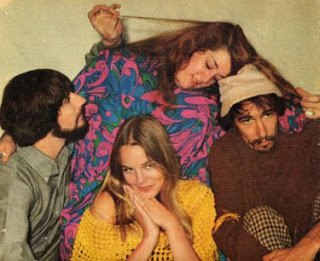 Greasin' on American Express card (don’t leave home without it) relates to the group having an American Express card which was used to finance the trip to the Virgin Islands. It belonged to one of the other Journeymen and was intended for Journeymen business. Of course, no one was making any payments on it by this time, and the group's departure from the Islands was actually precipitated by an American Express representative finally confiscating the card. Michelle said of the trip, "We did nothing but dropping acid, snorkeling, and smoking a lot of pot, and drinking. We would actually slice off the top of a coconut and pour rum into it."
Greasin' on American Express card (don’t leave home without it) relates to the group having an American Express card which was used to finance the trip to the Virgin Islands. It belonged to one of the other Journeymen and was intended for Journeymen business. Of course, no one was making any payments on it by this time, and the group's departure from the Islands was actually precipitated by an American Express representative finally confiscating the card. Michelle said of the trip, "We did nothing but dropping acid, snorkeling, and smoking a lot of pot, and drinking. We would actually slice off the top of a coconut and pour rum into it."Tents, low rents, and keepin' out the heat's hard./ Duffy's good vibrations, and our imaginations,/ can't go on indefinitely. These lines suggest that the group were tiring of life on the islands. "Duffy's" is the name of the boarding house on Creeque Alley (pronounced Creak-y Alley) in Charlotte Amali where many of the group's early songs were composed.And California Dreaming is becoming a reality
Published on August 03, 2021 04:58
August 2, 2021
The Last Time I Saw Richard - Joni Mitchell
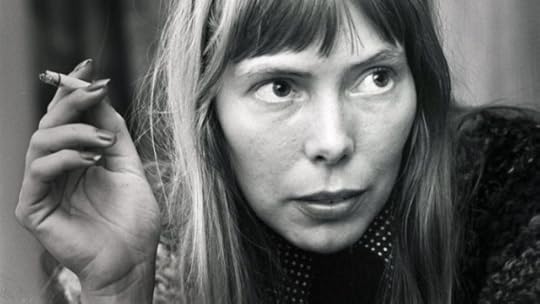 Joni Mitchell began her career busking and playing little clubs in Saskatoon Saskatchewan and in Toronto in the early 1960s with her husband, Chuck Mitchell. By the summer of 1969, she was a fixture in Laurel Canyon. Her first LP, Song to a Seagull, often called Joni Mitchellbecause the record company cut off part of the album cover's design, was produced by David Crosby. Crosby's production was meant to augment her singing style with one tactical error on his part. The idea was to have Joni sing into the opening of a baby grand piano to accentuate the reverb in her voice. That technique backfired and required David to edit out the excess vibration audible in the master tape. By doing so, the recording comes off a little flat, but maybe, as well, highlights the naivete in Joni's lilting soprano and youthful lyrics. The album isn't masterful but truly suggests what was yet to come. The LP is so overshadowed by Ladies of the Canyon, Blue, and Court and Sparkthat one is likely to overlook the LP, Clouds as well, Joni's sophomore effort, but that's unfair. The songs are talented and innovative, folky and naïve in a way that suggests the performance is more a private session; Joni truly solo.
Joni Mitchell began her career busking and playing little clubs in Saskatoon Saskatchewan and in Toronto in the early 1960s with her husband, Chuck Mitchell. By the summer of 1969, she was a fixture in Laurel Canyon. Her first LP, Song to a Seagull, often called Joni Mitchellbecause the record company cut off part of the album cover's design, was produced by David Crosby. Crosby's production was meant to augment her singing style with one tactical error on his part. The idea was to have Joni sing into the opening of a baby grand piano to accentuate the reverb in her voice. That technique backfired and required David to edit out the excess vibration audible in the master tape. By doing so, the recording comes off a little flat, but maybe, as well, highlights the naivete in Joni's lilting soprano and youthful lyrics. The album isn't masterful but truly suggests what was yet to come. The LP is so overshadowed by Ladies of the Canyon, Blue, and Court and Sparkthat one is likely to overlook the LP, Clouds as well, Joni's sophomore effort, but that's unfair. The songs are talented and innovative, folky and naïve in a way that suggests the performance is more a private session; Joni truly solo.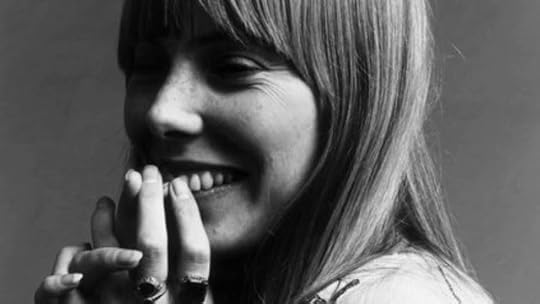
It's on Blue that we find the ultimate story song in "The Last Time I Saw Richard." Unlike the popular story songs of the time ("Wildfire," "Taxi," "Ode to Billie Joe"), here we don't find the kitsch often associated with the genre. This is hardcore realism. Joni's motif more often encompasses snippets of relationships as we, the listeners, take what we will and fill in the missing pieces. Yet "Richard," we get a full-blown short story, start to finish. Whether about Chuck Mitchell (or Taylor or Crosby or Nash or…), that we don't know, but the scene opens with Joni recalling a barroom conversation three years prior in which an older ex-lover attempts to shut down her youthful enthusiasm with melancholy and disparate philosophical musings: "All romantics meet the same fate someday: cynical and drunk and boring someone in some dark café." Pure poetry. Richard projects his misery onto her, scoffing when she laughs when he says: "Roses and kisses and pretty men to tell you all those pretty lies." Richard is bitter, though a youthful Joni cuts him off as he wallows in his pain with gushy love songs in the background that he's put on the jukebox. The scene takes place, by the way, in 1968, around the time Joni was establishing herself in the Laurel Canyon/Hollywood scene. The song is classic storytelling that evokes the idea that as time progresses we grow apart, we’re not the people we once were. Joni's eyes are "full of moon" and poor Richard Whiney Pants in his self-pity merely comes off as comical; the guy you just want to say, "deal," or prescribe Zoloft.
"The Last Time I Saw Richard" is a story song masterstroke that could have been written by an Emily (Dickenson or Bronte). I'm hard pressed to include it with the others we've talked about on the radio program as it provides none of that kitsch or camp one would find in both the worst of the lot (Bobby Goldsboro's "Honey," Rupert Holme's "Escape") or the best (Bruce Springsteen's "Highway Patrolman," or Leonard Cohen's "Famous Blue Raincoat"). Here, too, is one of those songs in which the poetry transcends the music.
Published on August 02, 2021 05:28
August 1, 2021
Two Cats in the Yard - 8217 Lookout Mountain Road
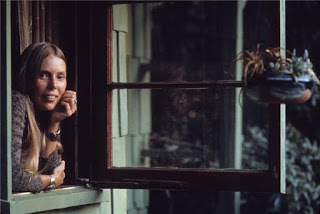
Research, is a sketchy thing, even when it comes from the source. I pieced together the "Our House" story as told by Graham Nash in a myriad of alternate versions:
"I came to live in America in 1969 and stayed with David [Crosby] for a couple of nights. He threw me a party and invited Joni [Mitchell], whom I hadn't seen since meeting her when I played with the Hollies. Suddenly, Joni was at the door and nothing else mattered. She was the whole package: a lovely, sylphlike woman with a natural blush, like windburn, and an elusive quality that seemed lit from within. Behind her, at the dining room table, were my new American friends David Crosby and Stephen Stills – refugees, like me, from successful, broken bands. I grinned the moment I laid eyes on them.
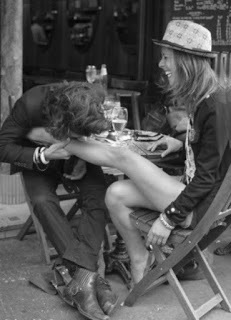 "I had never met anybody like Crosby. He was an irreverent, funny, brilliant hedonist who had been thrown out of The Byrds the previous year. He always had the best drugs, the most beautiful women, and they were always naked. Stephen was a guy in a similar mold. He was brash, egotistical, opinionated, provocative, volatile, temperamental, and so talented. A very complex cat, and a little crazy, he had just left Buffalo Springfield, one of the primo L.A. bands.
"I had never met anybody like Crosby. He was an irreverent, funny, brilliant hedonist who had been thrown out of The Byrds the previous year. He always had the best drugs, the most beautiful women, and they were always naked. Stephen was a guy in a similar mold. He was brash, egotistical, opinionated, provocative, volatile, temperamental, and so talented. A very complex cat, and a little crazy, he had just left Buffalo Springfield, one of the primo L.A. bands."That night, while Joni listened, the three of us sang together for the first time. I heard the future in the power of those voices. And I knew my life would never be the same. Joni and I had first met after a Hollies show in Ottawa, Canada in March. I'd seen this beautiful blonde in the corner by herself, and I’d shuffled over and introduced myself.
"'I know who you are,' she said, slyly. 'That's why I'm here.' After that party I went home with Joni and spent a couple of years with her in her home in Laurel Canyon.
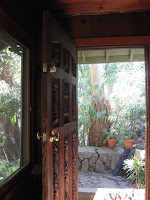 "One day Joan and I got up and went to breakfast at a delicatessen on Ventura Boulevard [Art's], and a few doors away there was a little antique store, and in the window Joan saw this vase, went inside, fell in love with it, bought it and brought it back to the house. It was a kind of a cold gray morning as it sometimes can be in Los Angeles, and I said, 'Why don't I light the fire and you put some flowers in the vase that you just bought.' So she's cutting stems and leaves and arranging flowers in this vase, and I'd lit the fire. Now, my and Joan's life at the time were far from ordinary … and I thought, 'What an ordinary moment.' Here I am lighting the fire for my old lady and she's putting flowers in this vase that she just bought. And I sat down at Joan's piano and an hour later, 'Our House' was written.
"One day Joan and I got up and went to breakfast at a delicatessen on Ventura Boulevard [Art's], and a few doors away there was a little antique store, and in the window Joan saw this vase, went inside, fell in love with it, bought it and brought it back to the house. It was a kind of a cold gray morning as it sometimes can be in Los Angeles, and I said, 'Why don't I light the fire and you put some flowers in the vase that you just bought.' So she's cutting stems and leaves and arranging flowers in this vase, and I'd lit the fire. Now, my and Joan's life at the time were far from ordinary … and I thought, 'What an ordinary moment.' Here I am lighting the fire for my old lady and she's putting flowers in this vase that she just bought. And I sat down at Joan's piano and an hour later, 'Our House' was written.I think the only thing that I've ever really tried to do with whatever talent I was given by God, is that I want to touch people's lives for the better. I have no choice about this writing thing; I have no idea where it comes from; I don’t want to question it too much. But I am so grateful that I can write."
Published on August 01, 2021 06:42
July 24, 2021
I Can See For Miles and Miles and Miles
Wow! Lots of requests the last few days for my novel, Miles From Nowhere. Miles was published a hundred years ago, way back in 2019, and due to an imperceptible error at the printers, they are sending me an overrun at a reduced rate.If you are interested in a copy, they are $8.00 including shipping (half off the Amazon/bookstore price). email me at rjsomeone@gmail.com and I will invoice you from Paypal. The first ten copies ordered come personalized.
Published on July 24, 2021 14:43
July 22, 2021
Chuck E.'s in Love - RIP Chuck E
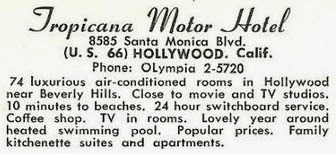
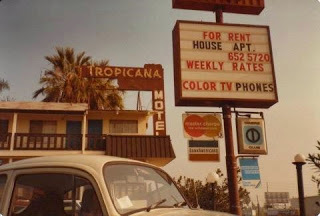 The Hollywood threesome that captured our attention in the late 70s was Tom Waits, Rickie Lee Jones and Chuck E. Weiss, who essentially became the most famous of the three, an accidental celebrity. In 1977, $65 bought a week at the seedy hipster paradise called the Tropicana on Santa Monica Blvd., just up the street from Barney's Beanery. Chuck E. slept on a couch, I suppose, or in the other bed. It's an assumption on my part, but as a compatriot hit up for quarters for the cigarette machine at the Troubadour on a regular basis, I can assume that he didn't have 65 bucks a week. "Chuck E.'s in Love" wouldn't be released for several more years, but the content of what may be the all time hippest single in pop history was already established. Waits, on the breadth of his first four LPs, but particularly on the success of Small Change, was already an established singer/songwriter, playing gigs at the Troub and at McCabe's in Santa Monica.
The Hollywood threesome that captured our attention in the late 70s was Tom Waits, Rickie Lee Jones and Chuck E. Weiss, who essentially became the most famous of the three, an accidental celebrity. In 1977, $65 bought a week at the seedy hipster paradise called the Tropicana on Santa Monica Blvd., just up the street from Barney's Beanery. Chuck E. slept on a couch, I suppose, or in the other bed. It's an assumption on my part, but as a compatriot hit up for quarters for the cigarette machine at the Troubadour on a regular basis, I can assume that he didn't have 65 bucks a week. "Chuck E.'s in Love" wouldn't be released for several more years, but the content of what may be the all time hippest single in pop history was already established. Waits, on the breadth of his first four LPs, but particularly on the success of Small Change, was already an established singer/songwriter, playing gigs at the Troub and at McCabe's in Santa Monica.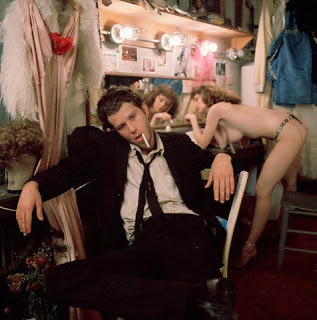 Tom and Cassandra Peterson (Elvira)Let's Rewind. Waits' previous album, Nighthawks at the Diner (1975), was recorded at the Record Plant studio with an audience to capture the ambiance of a live venue. It was a pretty telling album. Of it he said, "I was sick through that whole period. I'd been traveling quite a bit, living in hotels, eating bad food, drinking a lot — too much. There's a lifestyle that's there before you arrive and you're introduced to it. It's unavoidable."
Tom and Cassandra Peterson (Elvira)Let's Rewind. Waits' previous album, Nighthawks at the Diner (1975), was recorded at the Record Plant studio with an audience to capture the ambiance of a live venue. It was a pretty telling album. Of it he said, "I was sick through that whole period. I'd been traveling quite a bit, living in hotels, eating bad food, drinking a lot — too much. There's a lifestyle that's there before you arrive and you're introduced to it. It's unavoidable." Small Change (1976) found Waits in a cynical and pessimistic mood, with songs like "The Piano Has Been Drinking (Not Me) (An Evening with Pete King)" and "Bad Liver and a Broken Heart (In Lowell)." These were the songs that established Waits as a rock icon (including, of course, "Tom Traubert's Blues"). With Small Change Waits became a poster child, a poet laureate for off-kilter American cool and took his act overseas. Rickie Lee wasn't yet a part of his life.
That would change one fateful night at Doug Weston's Troubadour. Rickie Lee sang a short set of songs (including "The Moon is Made of Gold," only recently recorded for the album Balm in Gilead) following the performance of an obscure singer-songwriter named Ivan Ulz, who was instrumental in introducing several members of The Byrds, but little else. That night led to Tom's room at the Trop and a lifelong friendship of collaboration (if only temporary intimacy). Rickie never left and somewhere along the line, Chuck E. showed up.
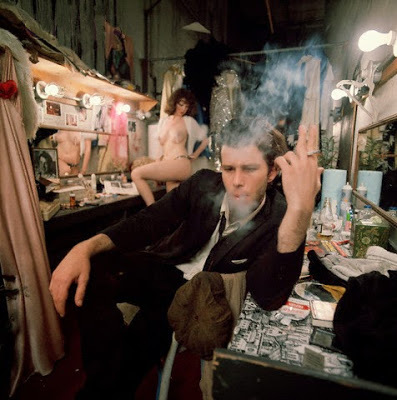 Then suddenly Chuck was gone, vanished. I went to the Troubadour and no one hit me up for a drink or for change. Every once in a while somebody'd say, "What happen to that guy?"
Then suddenly Chuck was gone, vanished. I went to the Troubadour and no one hit me up for a drink or for change. Every once in a while somebody'd say, "What happen to that guy?""Chuck E? I dunno."
Story goes that Chuck E. finally called Waits from Denver where he'd fallen in love with his cousin. When Waits got off the phone he said to Rickie, "Chuck E.'s in Love." Instrumental in the success of the Viper Room, just down from the Whiskey, Chuck E. Weiss's career as a singer/songwriter has never equaled his fame as that character in Rickie's story, the ending of which is fictional; there was never any relationship between the two. Chuck E. was "never in love with the little girl singin' this song."
Jay and the Americans is available all over the world!
Get Your Copy Today.
CreateSpace - Amazon - Amazon UK - Amazon France - Amazon Russia
Published on July 22, 2021 09:03



